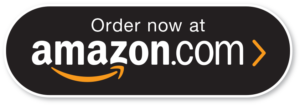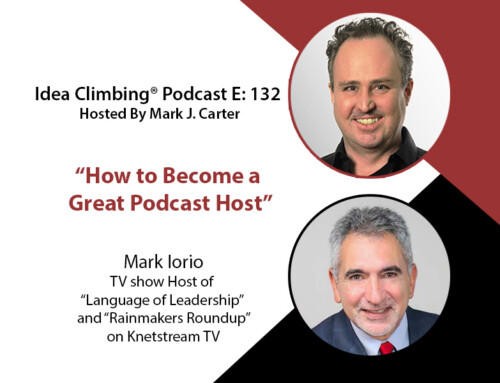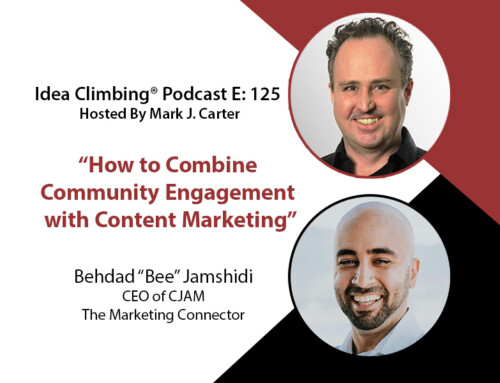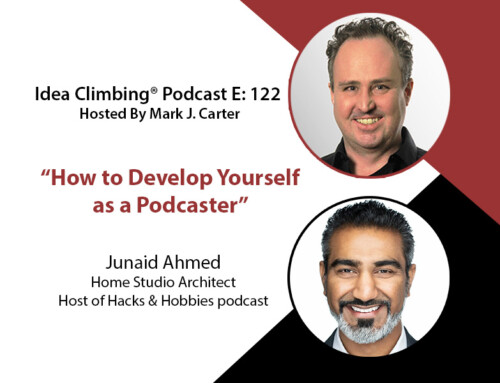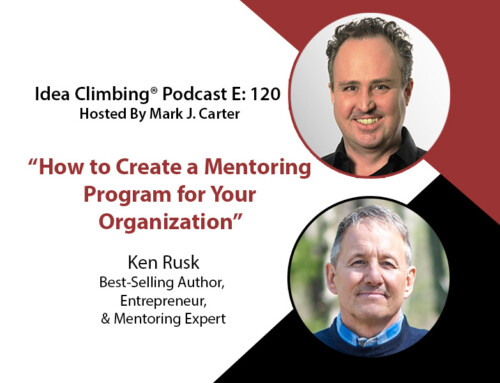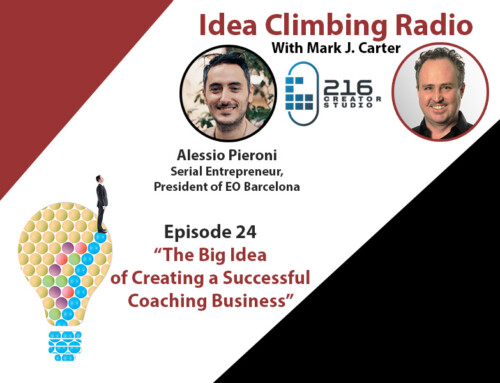So, you’re thinking about starting a podcast, but it seems like a daunting task. The good news is that it’s not! You just need a strategy to follow and take one step at a time. I thought about starting a podcast for entirely too long before pulling the trigger and starting one. If I could go back in time, I would tell my younger self “Just hit record. It won’t be perfect at first and probably never will be. Something published is always better than something thought about.”
As an entrepreneur you always need to level up your marketing outreach while increasing your brand recognition. A business podcast is an excellent way to do that if you have the right strategy in place. Let’s look at a way to create just that.
First, Create Podcast “Mentoring Experiences”
Not knowing how to get started is what prevents many people from entering the podcast space. That, or they jump into the deep end of the podcasting pool and hope they can swim. Not a good plan. To shorten my learning curve, I interviewed a LOT of business podcasters about how they got started before I launched mine. They served as my podcast mentors. Mentoring doesn’t have to be an ongoing relationship. In this case we’re talking about one-time “mentoring experiences”. In my book, “Idea Climbing: How to Create a Support System for Your Next Big Idea”, mentoring is defined as getting advice, support, and connections to solve a problem. You can get all three with the right outreach strategy.
My experience is that podcasters are generally generous people and I found they were happy to help with a brief call. That should be your first step. Get warm introductions whenever possible. Start by asking your network if they know any podcasters in similar markets to the one you want to enter and ask if they can introduce you. If you don’t have an extensive network, find podcasters on LinkedIn, or get their contact information from their websites and reach out to them.
During your calls have questions prepared to help bridge your “idea gaps” between where you are and where you want to be. What don’t you know about podcasting? The technology requirements? How to be a good interviewer? How to find guests? All the above or something else? Ask questions around your “idea gaps” and let experienced podcasters bridge the gaps for you.
Once you have a foundation of been-there-done-that advice it’s time to start your own podcast.
Before You Publish Your First Episode
Know WHY You Want to Start a Podcast: Starting a podcast to share your ideas is different from starting a podcast to monetize it with sponsorship. Be honest with yourself and move ahead accordingly. Personally, I started my podcast to expand my network and create mentoring experiences. We’ll look at that in a moment.
Define Your Target Market: WHO do you want to listen to your podcast? This is extremely important. Defining your target market early on will guide you to topics for your episodes and help with developing your overall marketing strategy once you launch.
Strategize Where You Will Find Your Guests: Do you have a built-in network, or will you be hunting for guests on LinkedIn or through referrals? This strategy will help you with the next tip, frequency of episodes. A built-in network means you can start sooner on publish more frequently than if you will be hunting for guests. Either way, it’s important to just get started.
Decide on the Frequency of Your Episodes: When I got started, I tried to record weekly, and it was overwhelming to learn a new skill set and find enough guests. My suggestion is to start with twice a month. With that frequency record six episodes before you start publishing them. That will give you breathing room with a three-month runway while you search for more guests.
Decide on the Length of Your Episodes: An experienced podcaster told me that because of Netflix our brains are wired for 20-something minute sitcoms or 50-something minute dramas. An easy way to decide which one to go with is to know how long you’re comfortable having a conversation for. My podcast is 20-something minutes long. That takes the pressure off me and makes it easier to find guests because a 30-minute session is easier to commit to than a 60-minute session.
Get Your Technology in Place: It’s worth the money to invest in professional software and equipment. That dramatically changes the quality of your audience’s listening and (if you’re using video) viewing experience. If you’re not going to edit your own podcasts (adding an intro/outro/music, etc.) no worries. There are countless freelance sites filled with people willing to do it for you at a reasonable rate. Personally, I taught myself the Adobe Suite of programs.
More good news: You don’t have to record for an hour and then do major editing to cut it down to 30 minutes like some people will tell you. You can record the whole conversation and leave it as is. That gives your episodes an organic, conversational feel and saves you hours of editing time or money spent on editing.
After much research into hosting companies, I landed on www.Blubrry.com. Their prices can’t be beat, and they have great tech support and an intuitive, easy to use interface. For a professional microphone I found that many professional podcasters use the very affordable Blue Yeti which was my choice.
Find Your Quiet Place: Ideally you have a home office or at least a room you can temporarily turn into a podcast recording space from time to time. To help eliminate echoes place blankets over hard surfaces, including your desk and your floors.
Podcasting as a Networking Tool
While many people focus on their podcast’s download and listening/viewing numbers there’s a more powerful reason to have a podcast. If you’re an active networker like me, here’s a strategy that just might give you the incentive you need to pull the trigger and start podcasting. Having a podcast is an excellent way to expand your network and marketing reach.
Who do you really want to meet and why? In my case when I got started, I wanted to learn more about bringing big ideas to life, like scaling my business. Rather than asking people for 30 minutes of their time with no value offered to them in return I asked people in my target market to be guests on my podcast. This allowed me the opportunity to learn from them while sharing their genius with my networks and gave them value for their time spent recording the episode. Almost everyone I asked agreed to be a guest on my 80-some episodes including my earliest episodes.
Another strategy I’ve discovered from established podcasters is that having a podcast opens the door to meeting referral sources to build your business and vice versa. Who might be able to refer business to you? What do they care about and want to learn about? Pick that topic and create a show for them around that topic. Invite them to be guests. You’ll be amazed at how fast the connections will fly. That’s better than randomly cold calling potential referral sources, right?
As an Entrepreneur You Probably Already Know This
If you own your own company, think about when you started it. What did you do? You made things happen. Taking action gets results, taking action sooner than later gets results sooner than later. Use the strategies outlined here to prime yourself for action and get moving.
The rewards will be great, and you’ll grow as a communicator and entrepreneur.
Onwards and upwards!
Want to learn how to build your business with podcasting? Check out this audio/video podcast episode: “How to Build Your Business with Podcasting with Steve Ramona”
You can get my book here: “Idea Climbing: How to Create a Support System for Your Next Big Idea”

